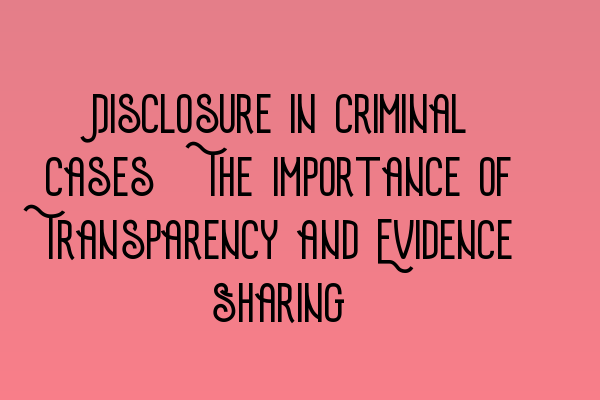Disclosure in Criminal Cases: The Importance of Transparency and Evidence Sharing
In criminal cases, the concept of disclosure plays a critical role in ensuring a fair trial and upholding the principles of justice. Disclosure refers to the process by which the prosecution and defense share relevant evidence with each other to enable both parties to prepare their cases effectively.
Transparency and evidence sharing are crucial elements in the criminal justice system. They serve as the foundation of a fair trial, ensuring that defendants have access to all evidence that may be used against them, and that the prosecution is required to disclose any evidence that may support the defense.
The Obligation of the Prosecution
The prosecution has a legal duty to disclose all evidence that is relevant to the case, whether it is incriminating or beneficial to the defendant. This includes not only evidence that the prosecution intends to rely on, but also any evidence that may weaken their case or support the defense.
The importance of this obligation cannot be overstated. Failure to disclose relevant evidence can have serious consequences, potentially leading to wrongful convictions and miscarriages of justice. It undermines the fairness of the trial and erodes public confidence in the criminal justice system.
The Role of the Defense
The defense also has a duty to be proactive in seeking disclosure of relevant evidence. It is essential for defense lawyers to carefully review the prosecution’s disclosure and identify any gaps or inconsistencies. This allows them to build a robust defense strategy and ensure that all relevant evidence is considered.
The defense may also request specific items of evidence from the prosecution through a formal process known as a “disclosure request”. This enables the defense to obtain access to additional evidence that may be vital to their case.
The Challenges of Disclosure
While disclosure is a fundamental aspect of criminal proceedings, it is not without challenges. The volume and complexity of evidence in modern criminal cases can be overwhelming. It requires efficient systems and processes to ensure that all relevant evidence is identified and shared in a timely manner.
Additionally, there may be instances where the disclosure of certain evidence poses potential risks, such as compromising ongoing investigations or endangering the safety of witnesses. In such cases, the court may impose restrictions on disclosure or establish procedures to mitigate these risks.
Conclusion
Disclosure is a critical pillar of the criminal justice system, promoting fairness, transparency, and the search for truth. It enables both the prosecution and the defense to present their cases effectively and ensures that all relevant evidence is considered.
At SQE Criminal Law & Practice Law UK, we understand the importance of disclosure and evidence sharing in criminal cases. Our team of solicitors is well-versed in the complexities of the law and ensures that our clients receive the highest level of representation.
For more information on related topics, you may find the following articles useful:
